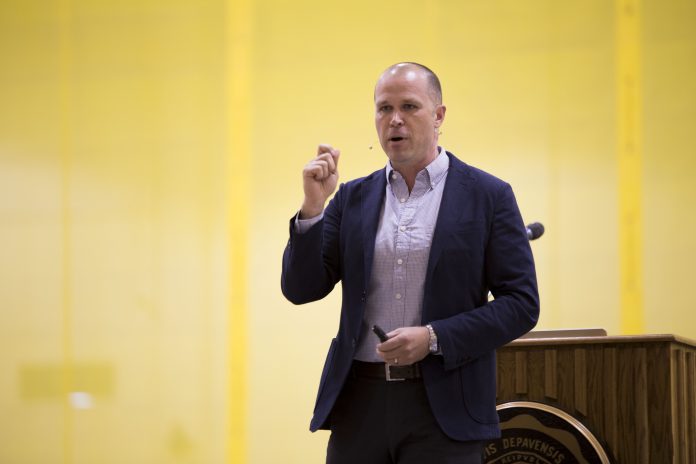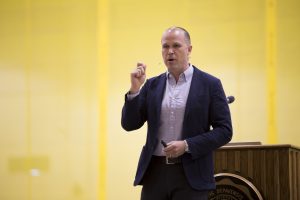

Acclaimed speaker and consultant Dr. Keith E. Edwards spoke as the endnote speaker for DePauw Dialogue 3.0.
Edwards has spoken on multiple college campuses about topics such as sexual violence, social justice, masculinity and discrimination. When doing so, Edwards emphasizes the ability of all students and faculty to use their privilege as a way to change the infrastructure of society’s innate biases.
The endnote began with an introduction by DePauw’s own Renee Madison, senior advisor to the president for diversity and compliance on campus. Madison said the Day of Dialogue, “gives [students] the opportunity to grow as a community…[and that students] need to carry the work done during Day of Dialogue out to the campus, and our world.”
Once Madison introduced Dr. Edwards, he began by pointing out how DePauw Dialogue creates “poignant moments for the community....[and that] the palpable moments within Day of Dialogue cannot end [that day].” Edwards prompted his listeners to reflect on what makes each student feel the need to speak up against racism or sexism in our community.
Edwards discussed how when difficult topics come to the surface, some seem to ignore the problem instead of addressing it. Usually because it is hard for us to admit the existence of social injustice, said Edwards. However, he argued against the indifference. “[We] must stay connected to the difficult things...since they require humans to use their compassion, which is the heart of change,” Edwards said.
Edwards said change is not something that a select group of people can cause. Instead, there must be a collaborative effort to make a difference both in the social justice system of DePauw and the Greencastle community. Edwards encourage the audience to look at their motivation for making change. “Whether it is for the people you love...for those who experience oppression….or for [yourself],” Edwards said.
When fighting for social equality, Edwards stated that people must think about how to become allies to those around us. He went on to state that while many want justice, there is a common trend to feel that one is immune to innate bias and thus an exception within the student body. However, in order to receive true equality, those with privilege must be willing to sacrifice what they have in order to have order in our social system, Edwards said.
Edwards continued stating the consequences of racism are usually found in the implicit areas of consciousness and this is part of the problem. “The implicit thoughts people have...must become explicit in order for change to occur,” Edwards said.
Edwards ended his speech by discussing the difference between guilt and shame, and how fostering accountability is the first step in changing our society’s point of view.
DePauw Student Government’s Vice President of Community Relations and student organizer for DePauw Dialogue, senior Sarah Fears believes the speech will encourage students to become true allies. “[Many] think they are quality allies to those being discriminated against,” said Fears, “There are still steps that [students] must take to consider themselves true allies.”


